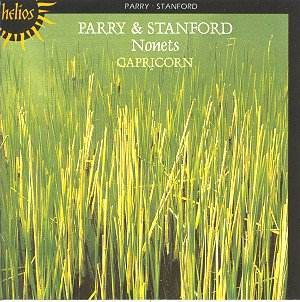PARRY and
STANFORD
Nonets
 Capricorn
Capricorn
Recorded 1987
 Helios CDH55061
[52:52]
Helios CDH55061
[52:52]
Crotchet
Amazon UK Amazon US

Parry's nonet dates from 1877 and is for winds (flute, oboe, cor anglais,
and two each of clarinets, bassoons and horns). The accepted major works
in the repertoire from the 19th century, (i.e. the Serenades by
Richard Strauss, Dvorak, and Gounod) all save those of Brahms are predated
by the Parry. Though Brahms exerted an enormous influence upon Parry (and
Stanford even more so) there are more redolent calls of Schumann and Liszt
in his nonet, with Wagner lurking, as ever, in the wings. Parry never heard
it played, a pity for it is an effective and interesting piece with colourful
instrumental textures and charming melodic inventions, wistful and reflective
in its slower moments, bitingly rhythmic in both the scherzo and the final
allegro. By way of contrast Stanford's nonet (1905) has the added advantage
and variety of string colour (flute, clarinet, bassoon, horn, two violins,
viola, cello, and double bass) to relieve what can be a somewhat unrelenting
sound without that featherbed. By this stage this experienced composer had
completed his sixth symphony and was beginning to make inroads into German
concert life with his Requiem. Yet despite Stanford's affinity to the Teutonic
style he produced a highly enjoyable work full of translucent textures and
fresh invention. It won deserved praise when it was first heard at a Broadwood
Concert in January 1906.
Both works are beautifully performed by Capricorn, a group formed in 1973
by the enterprising cellist Timothy Mason (who was also the founder of the
Orchestra of the Age of Enlightenment), whose death at 48, four years ago,
left a huge gap in the performing life of this country. He is to be heard
to good effect in Stanford's nonet, playing a striking phrase in one of the
variations of the quasi-Straussian Till Eulenspiegel scherzo. The members
of Capricorn (fourteen of them spread over the two works) make a starry cast
list of British string and wind players - invidious and unnecessary to single
out anyone other than Mason.
Christopher Fifield
Performance

Sound


